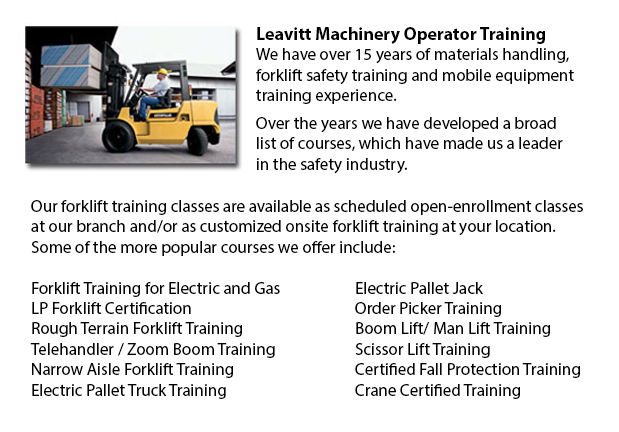
Brampton Forklift Certification Schools - Forklift Certification is mandatory in North America. Thus, forklift training programs are important both for companies and for individuals searching for work in industries as forklift operators. Forklift training focuses on safety and health issues included in utilizing forklifts. Safety issues affect both the driver of the forklift and workers and other individuals who are near the forklift. Businesses might be subject to penalties if they are caught with drivers who are un-certified during an inspection. There are numerous compelling reasons why companies need to follow forklift standards.
The majority of federal, state, and provincial regulations require an employee evaluation of the skills needed for forklift safety before the employer signs off that the worker is certified. There are several ways to acquire forklift training for workers, like for instance on-line forklift training. Nonetheless, employers have to be aware that forklift certification training is not "just a test". Correct forklift training must include several areas of study, like for instance theory and hands-on practice. Rules do not require employers to have an outside organization to certify forklift drivers.
A quality forklift certification school would include a suggested program that involves hands-on training that is performed on-site and classroom training. The training sessions inside the classroom incorporate videos, power point presentations, discussions and models. Students normally must write a test to check for comprehension of subject matter. Certificates of completion are issued upon successfully completing the class.
The use of the equipment evaluation needs the trainee to know the job site dangers, pre-operational equipment check, operational instruction and a pass/fail operational test.
Training usually includes the following subject areas: Understanding regulations and legislations; Controls & Instrumentation; Engine Operation and Maintenance; maneuvering and Steering; Fork and Attachment Restrictions, Visibility; Rated Capacities, Stability, Inspection & Maintenance; Load Manipulation; Refueling; Hazardous Places & Rough Terrain Operations and Pedestrians. In addition, there are training courses offered for employees who are transitioning to new job positions.
-
Brampton Aerial Boom Lift Ticket
Brampton Aerial Boom Lift Ticket - Aerial lift trucks might be used to accomplish several different tasks executed in hard to reach aerial places. Many of the tasks associated with this style of jack include performing routine maintenance on building... More -
Brampton Aerial Lift Train the Trainer
Brampton Aerial Lift Train the Trainer - The Aerial Lifts Train the Trainer Certification Program would teach trainers how to efficiently train operators in safe industrial mobile equipment operation. Trainers are provided with in-depth instruction o... More -
Brampton Zoom Boom Training
Brampton Zoom Boom Training - Zoom Boom Training is intended to train operators on variable reach forklifts. The goals of the training are to be able to impart an understanding of the physics of the machinery, and to be able to outline the operator's... More -
Brampton Heavy Equipment Operator Training
Brampton Heavy Equipment Operator Training - Heavy equipment operator training facilities that provide good standards within the industry, providing field performance work and additional machinery training are really sought after training features. S... More -
Narrow Aisle Forklift / Order Picker Training / Electric Pallet Jack / Electric Pallet Truck Training in Brampton
A pallet haul is equipment built in particular for moving pallets of irregular weights and dimensions. They may be used in conjunction with cranes, forklifts and other heavy duty equipment as an appendage piece or to be employed on their own. Pallet... More -
Brampton Overhead Crane Safety Training
Brampton Overhead Crane Safety Training - Overhead crane safety training equips operators with knowledge and skills regarding crane safety measures, accident avoidance, materials handling, and equipment and stock protection. Trainees will learn the k... More -
Brampton Crane Safety Training
Brampton Crane Safety Training - Companies and crane drivers have to know the problems associated to crane safety. Legislation provides rules for the safe maintenance, operation and inspection of lifting machines across North America. Crane Safety co... More -
Brampton Telehandler Training
Brampton Telehandler Training - Telescopic handlers normally known as telehandlers for short, are a really popular piece of heavy construction machinery. They are usually utilized in the construction and agricultural trades. These machines have farth... More

Forklift Certification Brampton
TOLL FREE: 1-888-254-6157
Brampton, Ontario
forkliftcertificationbrampton.com
Email Us
About Us


